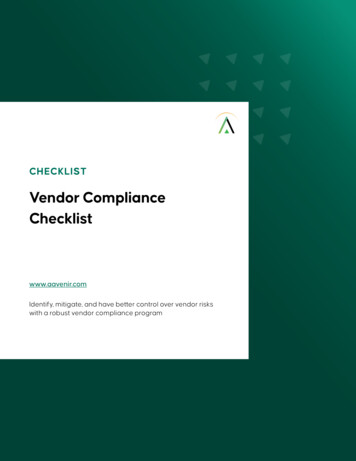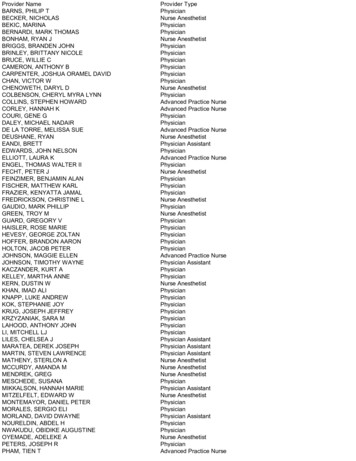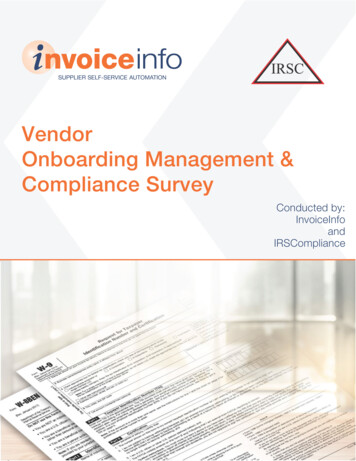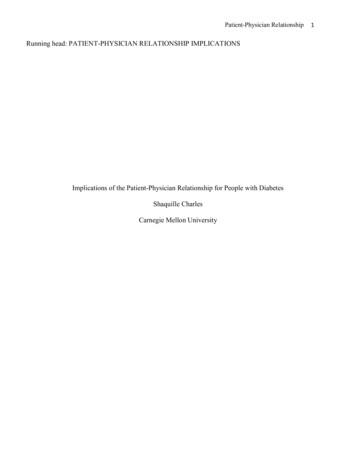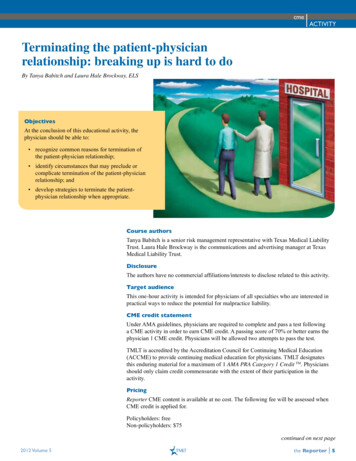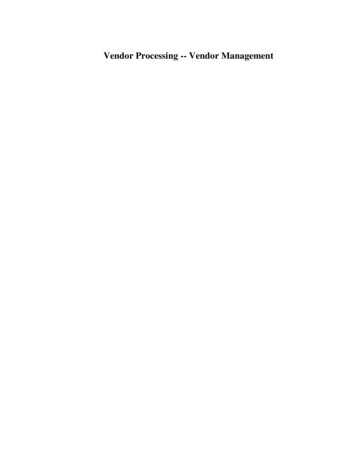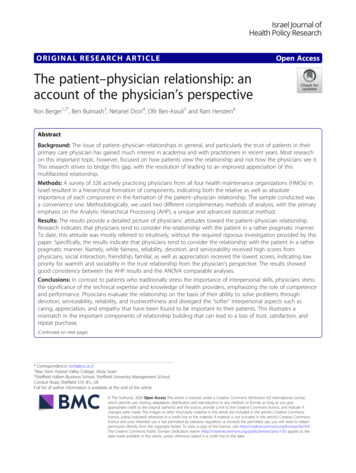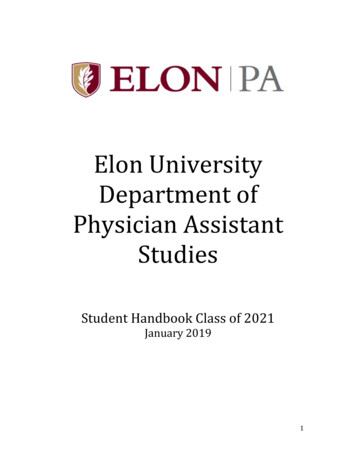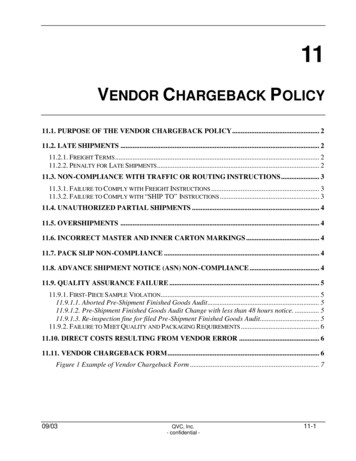
Transcription
Presenting a live 90-minute webinar with interactive Q&APhysician-Vendor Relationship Compliance:Minimizing False Claims, Anti-Kickback RisksWEDNESDAY, JANUARY 10, 20181pm Eastern 12pm Central 11am Mountain 10am PacificToday’s faculty features:Elizabeth A. Mulkey, Esq., Arnall Golden Gregory, Washington, D.C.Robert S. Salcido, Partner, Akin Gump Strauss Hauer & Feld, Washington, D.C.John R. Washlick, Shareholder, Buchanan Ingersoll & Rooney, PhiladelphiaThe audio portion of the conference may be accessed via the telephone or by using your computer'sspeakers. Please refer to the instructions emailed to registrants for additional information. If youhave any questions, please contact Customer Service at 1-800-926-7926 ext. 1.
Tips for Optimal QualityFOR LIVE EVENT ONLYSound QualityIf you are listening via your computer speakers, please note that the qualityof your sound will vary depending on the speed and quality of your internetconnection.If the sound quality is not satisfactory, you may listen via the phone: dial1-866-927-5568 and enter your PIN when prompted. Otherwise, pleasesend us a chat or e-mail sound@straffordpub.com immediately so we can addressthe problem.If you dialed in and have any difficulties during the call, press *0 for assistance.Viewing QualityTo maximize your screen, press the F11 key on your keyboard. To exit full screen,press the F11 key again.
Continuing Education CreditsFOR LIVE EVENT ONLYIn order for us to process your continuing education credit, you must confirm yourparticipation in this webinar by completing and submitting the AttendanceAffirmation/Evaluation after the webinar.A link to the Attendance Affirmation/Evaluation will be in the thank you emailthat you will receive immediately following the program.For additional information about continuing education, call us at 1-800-926-7926ext. 2.
Program MaterialsFOR LIVE EVENT ONLYIf you have not printed the conference materials for this program, pleasecomplete the following steps: Click on the symbol next to “Conference Materials” in the middle of the lefthand column on your screen. Click on the tab labeled “Handouts” that appears, and there you will see aPDF of the slides for today's program. Double click on the PDF and a separate page will open. Print the slides by clicking on the printer icon.
Physician-Vendor RelationshipCompliance: Minimizing False Claims,Anti-Kickback RisksCurrent Areas Targeted for EnforcementStrafford Live WebinarJanuary 10, 2018Robert SalcidoPartnerAkin Gump Strauss Hauer & Feld LLPrsalcido@akingump.com 2017 Akin Gump Strauss Hauer & Feld LLP
Current Areas Targeted For Enforcement False Claims Act Anti-Kickback Statute Stark law Equivalent State Laws6
The Primary Enforcement Vehicle Of These Statutes is the FCA 3.7 Billion in Fiscal year 2017. 56 Billion in FCA recoveries since 1986. A record 706 qui tam actions filed in 2016.7
Elements Of FCA Two Primary Elements to Establish FCA Liability Falsity Knowledge8
Falsity Defined The Second Circuit has defined the term “false or fraudulent” in theFCA as follows:“A common definition of ‘fraud’ is ‘an intentional misrepresentation,concealment, or nondisclosure for the purpose of inducing another inreliance upon it to part with some valuable thing belonging to him orto surrender a legal right.’ Webster’s Third New InternationalDictionary 904 (1981). ‘False’ can mean ‘not true,’ ‘deceitful,’ or‘tending to mislead’.”9
Knowledge Defined A person, under the FCA, is deemed to have acted “knowingly”when the person “acts in deliberate ignorance of the truth orfalsity of the information” or “acts in reckless disregard of thetruth of falsity of the information.” 31 U.S.C. § 3729(b).10
Selected Defenses To FCA Actions Literally True Claims Do Not Result In FCA Liability. FCA Does Not Apply To Claims That Are Not Objectively False. FCA Does Not Apply When Government Officials Are Aware Of The AllegedMisconduct. FCA Does Not Apply To Non-Materially False Representations. FCA Does Not Apply To Merely Negligent Conduct. FCA Does Not Apply When Defendant’s Conduct Is Consistent With AReasonable Interpretation Of The Law.11
The Anti-Kickback Statute Elements to Anti-Kickback Violation Offer or pay any remuneration. Induce another person to refer an individual to a person for thefurnishing or arranging for the furnishing of any item or service forwhich payment may be made in whole or in part under a Federalhealth care program. Do so knowingly and willfully.12
Valuable Defenses Under AKS Common industry practice. The actions are consistent with a legitimate business practice. Fair Market Value. Remuneration is not linked to specific false claims.13
The Stark Law Elements Underlying Stark Law A Physician (or Immediate Family Member) Referral Entity that furnishes Designated Health Services (“DHS”) Financial Relationship with the Entity DHS for which Medicare would pay Exception?14
Physician-Vendor RelationshipCompliance: Minimizing FalseClaims, Anti-Kickback RisksPresented by:Elizabeth Mulkeyelizabeth.mulkey@agg.comPresented to:Strafford WebinarJanuary 10, 2018 2018 Arnall Golden Gregory LLPAll rights reserved
Potential Pitfalls of Common PhysicianVendor Arrangements What laws apply to these relationships?– Anti-Kickback Statute– False Claims Act– Sunshine Act– Related State laws Where can these arrangements go wrong? What guidance has the government provided to physiciansand vendors in structuring these arrangements?16
Background Both the government and the public are concernedabout relationships between physicians and vendorsIn 2016, JAMA released a report on the link betweenpharmaceutical industry expenditures and physicianprescribing of name brand drugs– Study found that receipt of industry-sponsored meals affectedphysicians’ prescriptions of brand-name products relative togeneric alternatives in the same drug class– While the study did not establish a temporal link betweenmeals/educational sessions and prescribing, the study notedthat receipt of a single industry-sponsored meal, with a meanvalue of less than 20, “was associated with prescription of thepromoted brand-name drug”17
OIG’s Roadmap for Physician-VendorRelationships OIG offers a guide for new physicians, providing a basicoverview of common areas of non-compliance–––––Free SamplesSham Consulting AgreementsLack of TransparencyConflict of Interest DisclosuresContinuing Medical Education18
The PhRMA Code The PhRMA Code on Interactions with HealthcareProfessionals– Voluntary, but has become standard– Blessed by OIG “Although compliance with the PhRMA Code will not protect amanufacturer as a matter of law under the anti-kickback statute, itwill substantially reduce the risk of fraud and abuse and helpdemonstrate a good faith effort to comply with the applicable federalhealth care program requirements.”– Is “law” in a handful of states: California, Connecticut, Nevada,Washington D.C.; very similar laws in Vermont andMassachusetts– Outlines key risk areas and rules of engagement.– Addresses consultants, meals, entertainment, gifts, CME,meeting sponsorships19
The Sunshine Act Calls for reporting to a publicly-available database of informationregarding transfers of value from industry to physicians (M.D.s,D.O.s, chiropractors, dentists, podiatrists, and optometrists) andteaching hospitals, as well as ownership of industry by physiciansThe law applies to “applicable manufacturers that have anapproved product that is reimbursed by Medicare or Medicaid (180day grace)– Once covered by the law, it applies to everything, including R&DReports are due by March 31 of each year and include the entiretyof the previous calendar yearCMS administers the “Open Payments” program, and informationfrom annual reports is available online (2016 now posted)20
The Sunshine ActNature of Reportable Payments A transfer of value can be direct or indirect, and �–Consulting feesCompensation for services other than consultingHonorariaGifts (includes reprints)EntertainmentFoodTravelEducation (in-person events, not materials)ResearchCharitable contributionRoyalty or licenseCurrent or prospective ownership or investment interestDirect compensation for serving as faculty or speaker for medical educationprogramGrantAny other transfer of value21
The Sunshine ActExcluded Payments and Transfers of Value Transfer of anything of value less than 10 ( 10.49 for 2018), unlessaggregate annual amount per covered recipient exceeds 100( 104.90 for 2018) Product samples–but still reported under Section 6004 of ACA Educational materials for patients’ use/benefit Loan of a covered device for a short-term trial period, not to exceed 90days Items or services provided under a contractual warranty, including thereplacement of a covered device Discounts In-kind items used for the provision of charity care Dividends or other profit distribution forms Several others related to covered recipients when not in the context oftheir professional capacity (e.g., as a patient, legal proceeding)22
The Sunshine ActPreemption and State LawsThe law preempts state reporting requirements thatduplicate the new federal reporting requirements onpayments or other transfer of value However, any additional requirements that statesmay choose to impose are not preempted A number of states have non-preempted reportinglaws that apply to healthcare professionals otherthan physicians: Connecticut, Minnesota,Massachusetts, Vermont Some cities and states have enacted “detailer” laws(e.g., D.C., Maine, and Chicago)23
The Sunshine ActCivil Penalties for NoncomplianceCovered entities are subject to penalties forfailure to comply with the federal reportingrequirements; penalties are per instanceMinimumMaximumTotal AnnualLimitationFailure to Report 1,000 10,000 150,000Failure to report,Knowingly 10,000 100,000 1,000,00024
What “Pitfalls” Can Lead to EnforcementAction? Physician-Owned Entities– Frequently referred to as Physician-Owned Distributorships, orPODs Laboratory payments to physicians– Specimen Processing Agreements– Registry Payments “Sham” consulting agreementsFalse claims predicated on off-label promotion25
OIG Compliance Program GuidanceFor Pharmaceutical Manufacturers The Office of Inspector General identifies sevenelements of an effective compliance program–––––––Written Policies and ProceduresCompliance Officer / CommitteeEffective Training and EducationEffective Lines of CommunicationInternal Auditing and MonitoringEnforcement of Standards and DisciplineResponding, Investigating and Remedial Action26
Physician Vendor RelationshipsCompliance PlanningJohn R. Washlick, Esq.215-665-3950John.washlick@bipc.com27
Compliance Planning“a conflict of interest between physicians’commitment to patient care and the desire ofpharmaceutical companies and their1representatives to sell their products.”- JAMA 20061Troyen Brennan et al., Health Industry Practices That CreateConflicts of Interest, 295 JAMA 429 (January 25, 2006).28
Compliance PlanningAMERICAN MEDICAL ASSOCIATION“ [these gifts] may create the perception ofunethical behavior. That perception underminesour credibility with patients and the public.”29
Compliance PlanningOIG GUIDANCE: 1992 REPORT Promotion of Prescription Drugs Through Payment and Gifts (OEI-01-90-00480) Acceptance of promotion related money or other items of value frompharmaceutical companies “has, at a minimum, the appearance ofimpropriety.” This appearance is “damaging to the public’s confidence in the medicalprofession” It’s a kickback stupid!! OIG observed that the practice may indeed be“illegal,” violating the AKS –30
Compliance Planning Develop Policies and procedures governing all physician/vendorrelationships Clearly articulate the purpose – Avoid conflicts of interest thatcould compromise professional judgment and quality of patientcare Define appropriate interactionsMinimize undue influenceStaff should be shielded from marketing interference Define the scope – Policy should apply to all professionals withinthe organization who deliver care or who are involved in drug andDME procurement31
Compliance PlanningGuidance Sources: American Medical Association American College of Physician-American Society on InternalMedicine (ACP) American Osteopathic Association PhRMA Code AdvaMed Code of Ethics OIG CPG Individual and Small Group Physician Practice Guidance OIG CPG for Pharmaceutical Manufacturers32
Compliance Planning Adopt, implement and enforce Conflicts of Interest Policy Apply to all individuals who play a role in decision making for drug or DMEprocurement Disclosure should be made to superiors, compliance officer or independentbody (e.g. audit committee) Document resolution of conflict Require updates no less than annually Decisions should be evidence-based Adopt and implement procedures to review and approve vendorcontracts regarding gifts, conferences and research33
Compliance Planning Industry Interaction – limit or restrict contacts Restrict use of provider resources by industry representative (e.g., no use of email or fax of promotional materials) No compensation to staff for listening to vendor detailing Restrict contacts to designated areas Require industry representatives to wear special badges that clearly distinguishthem from other guests Restrict access to staff contact information Scrutinize charitable donations from vendors34
Compliance PlanningSpecific physician/vendor activities Gifts – Decide on an acceptable standard if not a complete ban, asrecommended by JAMA CME – At a minimum, consider policy that prohibits payment forsimply attending conferences or payment for time and travel tomeeting for non-faculty attendees Meals - Physicians receiving industry-sponsoredmeals request1,2formulary additions more frequently Physician should consider whether to allow vendor meals during non-ACCMEapproved programs. Vendor meals should be banned from purely social events.35
Compliance PlanningSpecific Physician/Vendor Activities Speaking engagements - Physicians who accept drug company1,2honoraria are more likely to request formulary additions. Stipendor honoraria arrangements should require:― Written contract from vendor setting forth specific deliverables Manufacturer/vendor shall have no influence on the substance of theeducational program Meeting sponsor should fully disclose financial support from vendor Program shall be unbiased assessment of therapeutic options Acceptance by physician to participate does not impose any purchaseobligations Clear statement that the content of presentation reflects views ofpresenter, NOT the vendor36
Compliance Planning Consulting and Advisory Payment – Require explicit writtencontract with deliverables relating to scientific issues Drug Samples – Consider the voucher system suggested by JAMA,limiting distribution of samples to low-income patients Sampling is not an indigent drug program― Samples are promotional in nature― Samples often not used for indigent patients 1,2Monitoring and accounting for samples is a challenge― No documentation of safe practices― Logs and labeling are not complete― Issues of drug recalls and instructions for patients37
Compliance Planning Drug Samples (cont’d) Samples lead to inappropriate prescribing― Accepting samples was associated with awareness, preference and rapid1prescription of a new drug― Residents who were randomized to use samples were less likely toprescribe over-the-counter medications and more likely to prescribe2advertised drugs than residents randomized to agree not to use samples― In a survey of physicians at an AMC, it was found that in the treatment ofan uninsured male hypertension patient, over 90% of physicians who usesamples would dispense a sample that differed from their preferred drug3choice38
Compliance Planning Drug Samples (cont’d) Vouchers― Take samples out of practices― Improve Patient Safety― Improve Prescribing habits― Permit better screening for ADEs― Allow for better patient instructionsGeneric Sampling Drug Formularies – Physicians should disclose all conflicts andrecuse themselves from making decisions regarding drug/productpurchases39
Compliance Planning Research Grants Should be reviewed by IRB or other oversight committeeRequire written contract with deliverablesAll funding should be FMV for bona vide servicesFunding should be paid to central organization or oversight committeeEnrollment of patients in clinical trials should cover direct and indirect costsand should be budgeted No reimbursement for providing lists of patients No payment for passive consulting40
Compliance Planning Industry marketing activities Professional staff should not participate in industry marketing activities. Thisincludes, but is not restricted to, dinners, socials, entertainment eventsPhysicians should not give lectures at marketing activitiesCME-approved activities supported by Industry are appropriate so long asvendor does not control the content Educational materials for physician offices: Need to separate“educational” materials from product promotional materials. Writing activities – Physicians should disclose any related financialinterests and should ban the publicity of articles under their ownname that have been written in whole or in part by vendoremployees41
Compliance Planning Hospitals as Vendors Stark Compliance― Personal Services Exception― Medical Staff Incidental Benefits― Professional Courtesies― Charitable Donations AKS― Quid Pro Quo― FMV42
Physician-Vendor Relationship Compliance: Minimizing False Claims, Anti-Kickback Risks Today's faculty features: 1pm Eastern 12pm Central 11am Mountain 10am Pacific The audio portion of the conference may be accessed via the telephone or by using your computer's speakers. Please refer to the instructions emailed to registrants for .
